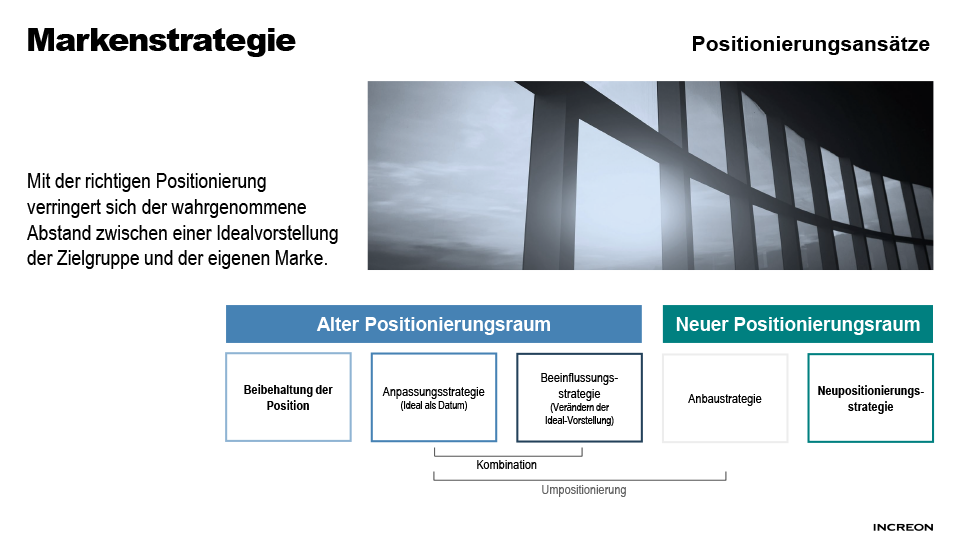

Brand Positioning
Clear statements on the various aspects of B2B brand positioning are key to successfully developing a strong B2B and industrial brand with the right service offering for the right target groups.

WHY BRAND POSITIONING?
To consistently communicate corporate goals and strategy, brand, and value proposition.
Brand positioning is part of the brand strategy. It makes a significant contribution to ensuring that a B2B brand is firmly anchored in the minds of decision-makers and decision-preparers in industrial and technology companies. It also ensures that the brand clearly differentiates itself from other brands and other suppliers. The clearer, more comprehensible, and more tangible the brand positioning is, the better the brand is remembered by the relevant target groups, and the more authentic and credible it is. In the end, a B2B brand must be so attractive that it is preferred over competing offers. That is the goal of brand consulting. That is when the brand position makes a sustainable and effective contribution to customer loyalty and customer acquisition. Brand loyalty grows.
Clear brand positioning gives decision-makers and customers an orientation as to what the offer can do and for whom or which application it is best suited. Therefore, brand positioning is based on a company’s capabilities and product and service quality. But it also shapes brand image — the image of the brand in the minds of customers. For this reason, brand positioning is closely linked to brand identity.
How is B2B brand positioning developed?
At its core, the development of strong B2B brand position lies with the company management, which must be involved in such consulting projects. This is where the long-term corporate goals and corporate strategy are defined. This knowledge drives the brand strategy and brand positioning. Of course, other business units must also be involved. The marketing department, executives from development, production, sales, or HR can be involved. This always depends on the specific corporate structure.
It is about the change of perspective in B2B brand positioning.
Positioning is not just about how great and good and unique one’s own company and products are. The consulting we provide is primarily about what your customers need. And on top of that: what your customers want! B2B companies have to be measured against this. With this shift from “What we are good at” to “What customers want and what we can do about it,” we develop a customized brand position during our brand consulting activities for B2B companies, which, in conjunction with a clear brand identity and credible brand values, provides a solid basis for daily brand work.
When do you need to work on brand positioning?
Work on brand positioning can become necessary at different points in time. With the right positioning, the perceived gap between an ideal image in the minds of the relevant target groups and the reality of one’s own brand is reduced. The typical project structure follows three phases: Analysis, concept work, and implementation.
Initial positioning
A typical reason for initial positioning is the launch of a new company or a new offering. In increasingly narrow B2B markets, which companies wish to serve with products or services that are more or less comparable at first glance, the elaboration of positioning aspects in consulting requires a high degree of discipline and a far-sighted view of possible market developments. Communication and emotional uniqueness in brand development and brand communication are based on brand positioning. This ensures long-term brand management and development of the brand personality.
Position update
The aim of updating a position is to use the position gained in the long term or to expand it strategically, not least in order to keep the competition at bay. Position updating can go hand in hand with differentiation of the range of products and services. In the horizontal direction, this involves the development of the B2B single brand into a B2B family brand or B2B umbrella brand.
Repositioning
Repositioning often consists of making strategic changes in particular aspects. Or repositioning may involve adjustments that result from the changing zeitgeist or new market demands. Repositioning makes it possible to experience a proven product or a valued service in a new way. Rarely is repositioning associated with radical product changes.
Position reinforcement
Position reinforcement in B2B brand management is about defending the position gained against competitors. By vividly staging the positioning aspects, the distance to competitors can be maintained. And by maintaining the brand, the position can be preserved, which ensures your success in the long term. The B2B brand core remains untouched; only the positioning aspects are constantly confirmed to the market and communicated in a varied manner.
The complete brand positioning depends on its precision. In brand consulting, every word and the tone of the wording that sums up the content is important to us. This applies to the positioning of the company as a brand as well as to the positioning of individual brands, family brands, or umbrella brands. In the end, brand positioning for B2B brand management is the basis for all branding, marketing, and communication activities.





